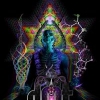Yeah, unfortunaly there isn't many stories on BPAP. Apparently many people where upset about the quality of the product they recieve, and the fact that it was mix in DSMO -which could be neurotoxic. There was also some problem with an extra 1g of pure BPAP in powder form.
All in all, base on the few account I read BPAP did gave some initial boost, but in the end didn't live to people's expectations. Spark51 mention some very bad withdraw, his statment is in the BPAP group buy thread page 12.
Here a descrition of BPAP, from tht.co:
Description:
(-)-BPAP was developed in the search for drugs with similar catecholaminergic activity enhancing effects to (-)deprenyl (Selegiline), which can slow the functional decline of patients with early Parkinson's disease and the progression of Alzheimer's disease. [1]
(-)-BPAP is a highly potent and selective catecholaminergic activity enhancer (CAE). [1] It increases release of the neurotransmitters dopamine, norepinephrine and serotonin in response to stimuli. [2] In this action it is similar to (-)deprenyl (Selegiline), though (-)-BPAP lacks the potent monoamine oxidase inhibitory action of (-)deprenyl. Like (-)deprenyl, (-)-BPAP blocks tyramine-induced norepinephrine release. [3]
The triptamine-derived (-)-BPAP is roughly one hundred times more potent as an enhancer of the catecholaminergic neuronal activity than the phenethylamine-derived (-)deprenyl, and unlike (-)deprenyl, (-)-BPAP strongly stimulates serotonergic neurons. [4]
In addition to Parkinson's and Alzheimer's disease, (-)-BPAP has been studied as a potential treatment for major depression. [4]
“(-)-BPAP is the only available, and the most selective and potent enhancer substance for in vivo and in vitro studies of the [catecholamine] enhancer effect. (-)-BPAP significantly enhanced the impulse propagation-mediated release of [3H]norepinephrine and [3H]dopamine from the isolated rat brain stem at 0.18 nM concentration and enhanced the release of [3H]serotonin at 36 pM concentration.” [5]
In rats, (-)-BPAP has a t1/2 beta (elimination half-life) of 5.5 - 5.8 hours, and readily crosses the blood brain barrier. [6]
- Oka T, Yasusa T, Ando T, Watanabe M, Yoneda F, Ishida T, et al. Enantioselective synthesis and absolute configuration of (-)-1-(benzofuran-2-yl)-2-propylaminopentane, ((-)-BPAP), a highly potent and selective catecholaminergic activity enhancer. Bioorg Med Chem. 2001 May;9(5):1213–9.
- Knoll J, Yoneda F, Knoll B, Ohde H, Miklya I. (-)1-(Benzofuran-2-yl)-2-propylaminopentane, [(-)BPAP], a selective enhancer of the impulse propagation mediated release of catecholamines and serotonin in the brain. Br J Pharmacol. 1999 Dec;128( :1723–32.
- Shimazu S, Tsunekawa H, Yoneda F, Katsuki H, Akaike A, Janowsky A. Transporter-mediated actions of R-(-)-1-(benzofuran-2-yl)-2-propylaminopentane. Eur J Pharmacol. 2003 Dec 15;482(1-3):9–16.
- Gaszner P, Miklya I. Major depression and the synthetic enhancer substances, (-)-deprenyl and R-(-)-1-(benzofuran-2-yl)-2-propylaminopentane. Prog Neuropsychopharmacol Biol Psychiatry. 2006 Jan;30(1):5–14.
- Shimazu S, Miklya I. Pharmacological studies with endogenous enhancer substances: beta-phenylethylamine, tryptamine, and their synthetic derivatives. Prog Neuropsychopharmacol Biol Psychiatry. 2004 May;28(3):421–7.
- Magyar K, Lengyel J, Bolehovszky A, Knoll B, Miklya I, Knoll J. The fate of (-)1-(benzofuran-2-yl)-2-propylaminopentane . HCl, (-)-BPAP, in rats, a potent enhancer of the impulse-evoked release of catecholamines and serotonin in the brain. Eur J Drug Metab Pharmacokinet. 2002 Sep;27(3):157–61.















































